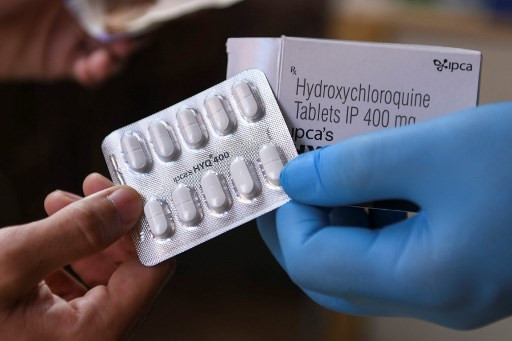Popular Reads
Top Results
Can't find what you're looking for?
View all search resultsPopular Reads
Top Results
Can't find what you're looking for?
View all search resultsAuthors pull study flagging hydroxychloroquine risks
Change text size
Gift Premium Articles
to Anyone
 This photo taken on April 27, 2020 shows a vendor displaying hydroxychloroquine (HCQ) tablets at a pharmacy in Amritsar. India has ramped up output of an anti-malarial drug hailed by US President Donald Trump.Three of the four authors behind a study in The Lancet that raised safety fears over the use of a drug favored by President Donald Trump to treat COVID-19 withdrew their research Thursday, blaming a company that supplied the data. (AFP/Narinder Nanu )
This photo taken on April 27, 2020 shows a vendor displaying hydroxychloroquine (HCQ) tablets at a pharmacy in Amritsar. India has ramped up output of an anti-malarial drug hailed by US President Donald Trump.Three of the four authors behind a study in The Lancet that raised safety fears over the use of a drug favored by President Donald Trump to treat COVID-19 withdrew their research Thursday, blaming a company that supplied the data. (AFP/Narinder Nanu )
T
hree of the four authors behind a study in The Lancet that raised safety fears over the use of a drug favored by President Donald Trump to treat COVID-19 withdrew their research Thursday, blaming a company that supplied the data.
It was soon followed by the retraction of another coronavirus paper in the New England Journal of Medicine (NEJM), which was not linked to hydroxychloroquine but used the same healthcare firm's patient records.
The Lancet study claimed to have retrospectively analyzed some 96,000 patient records, finding that hydroxychloroquine and chloroquine, common anti-malarials, were ineffective against COVID-19 and even increased the risk of death.
Heart arrhythmia was flagged as a particular concern.
This finding led the World Health Organization to temporarily suspend clinical trials into the medicines.
But the paper soon triggered widespread concern among scientists over a lack of information about the countries and hospitals that contributed data.
Mandeep Mehra, a professor at Harvard University who led the work, along with Frank Ruschitzka of the University Hospital Zurich and Amit Patel of the University of Utah, said in a statement they had tried to launch a third-party peer review.
But Surgisphere, a little-known healthcare analytics firm based in Chicago that provided the data, refused to cooperate.
"Due to this unfortunate development, the authors request that the paper be retracted," the three said.
"We deeply apologize to you, the editors, and the journal readership for any embarrassment or inconvenience that this may have caused."
The Lancet, a British journal, offered its own statement, saying "there are many outstanding questions about Surgisphere and the data that were allegedly included in this study."
Sapan Desai, a vascular surgeon and Surgisphere's chief executive, did not join the retraction and declined to comment to AFP.
Despite the finding apparently vindicating hydroxychloroquine's safety, there is not yet any proof from a randomized clinical trial (RCT) that the medicine works against COVID-19.
One such trial that was published Wednesday found it was not significantly better than a placebo in preventing the disease among people who had been recently exposed to the virus.
But scientists broadly agree that more RCTs -- considered the gold standard for clinical investigation -- are needed, and hydroxychloroquine should not be discounted yet.
Research scandal
The research scandal threatens to undermine confidence in the world's leading medical journals in the midst of a pandemic.
The paper in the NEJM investigated whether people who take commonly used blood pressure medicines became more or less likely to get COVID-19.
It was released on the same day as two other studies investigating the same topic, with all three finding that these medicines do not heighten susceptibility to infection, or increase the risk of becoming seriously ill.
No questions have been raised about the integrity of the other two papers.
In their retraction statement, the NEJM paper's authors also wrote that the data was not made available to a third-party auditor.
"We therefore request that the article be retracted."
Sci-fi author and adult model
Researchers began to closely scrutinize The Lancet paper shortly after its publication, highlighting numerous red flags ranging from the huge number of patients to the unusually complete information on their demographics.
Internet sleuthing by the Guardian revealed that Surgisphere had a scant online presence, with only a handful of staff listed on LinkedIn including a science fiction author and an adult model.
The firm was involved in yet another attention-grabbing study that found the anti-parasite drug ivermectin could be useful against COVID-19.
Though this paper had not been peer-reviewed or appeared in a journal, it caused a run on the drug in Latin America where it is widely available.
While Desai and Surgisphere have been the focus of most scrutiny, the lead author of all of these papers was Mehra, who is also the medical director at Brigham and Women's Hospital (BWH) Heart and Vascular Center in Boston.
The lead author is considered responsible for performing due diligence on data and vouching for its integrity.
Chris Chambers, a professor of psychology at Cardiff University, added the affair "raises serious questions about the standard of editing at the Lancet and NEJM -- ostensibly two of the world's most prestigious medical journals."









